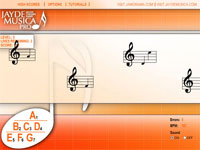Piano Lessons: Creating an Impressionistic Soundscape
>> Dont Even Think Of Trying Other Prodicts untill You Read This <<
Ah? the Soundscape. That indefinable rush of notes that envelopes and soothes. The first classical composer to really embrace this type of music was Claude Debussy.
In fact, a whole style of music (Impressionism) was coined based on his music alone.
It's a lush style that tries to steer clear of too definable a melody line. Instead, textures and rhythms are explored. Some students think this style is the hardest to learn but I think it's actually easier to play this style than the straight melodic style embraced in the classical period.
For the improvising pianist, creating an impressionist Soundscape requires nothing more than learning a few chords and playing them.
Debussy based much of his music on something called the whole-tone scale. This scale basically takes out any "tension" that can be found in our major and minor scales. The Chinese and Japanese use pentatonic scales frequently and this is also similar.
But, we don't have to use these scales to create our Soundscape. The C Major scale will work just fine. For instance, in the lesson "Reflections in Water," we use open position chords to create with. It's HOW we use them that gives us the feeling of a Soundscape.
We play slowly and allow the notes to ring out. No rushing is involved here. Instead, we adapt an attitude of exploration. The music is created by allowing our fingers to play with the tones in the C Major scale. Chord changes come every few bars or so. The music is repeated a few times and then we stop.
You see, you don't need fancy materials to create beautiful Soundscapes with. You can use just a few chords from the C Major scale and improvise a beautiful piece of music! We play with the textures and allow the music to appear - without forcing or willing it into being.
Edward Weiss is a pianist/composer and webmaster of Quiescence Music's online piano lessons. He has been helping students learn how to play piano in the New Age style for over 14 years and works with students in private, in groups, and now over the internet. Stop by now at http://www.quiescencemusic.com/piano_lessons.html for a FREE piano lesson!
Labels: computer_learn_piano, free_learn_lesson_online_piano, learn_blues_piano, learn_piano_fast, learn_piano_online_free, learn_piano_software

